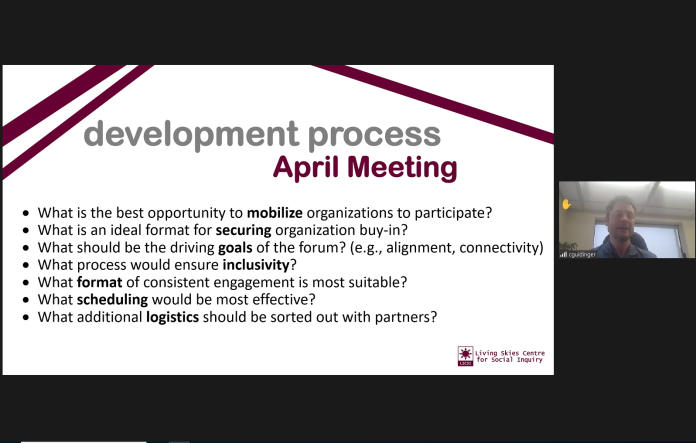
On Tuesday, around 25 representatives from various service agencies, businesses and community partners in Prince Albert logged on to the second engagement session for the Chronic Risk Solutions Forum hosted over Zoom by Dr. Chad Nilson of Living Skies Centre for Social Inquiry and City Planner Craig Guidinger.
The meeting gave participants the opportunity to voice their opinions on what they believe is the Forum’s best course of action while building solutions to mitigate chronic risk for individuals in Prince Albert.
From developing a chronic risk care centre to open up needed Emergency Room beds to looking into enforcing addictions treatment; Guidinger said insight is needed from all perspectives, as dealing with chronic risk is a shared responsibility from all areas in the community.
Executive Director of the West Flat Citizens Group Dawn Robins said she would like to see the Forum focus on interventions for at-risk youth, as solutions won’t work unless the group works from the bottom up.
“We need to ground our kids and start focusing on our kids so that they grow up to be better people, regardless of what their home life is,” said Robins. “If we don’t start working with our youth, we’re always going to come up with the same issues. We need to stop those systems being overloaded by our youth turning to drugs, alcohol, [and] violent gangs.”
“Giving them opportunities to explore different things like sports, culture, recreation is important so that we help fill the sense of belonging,” she added.
In an interview with the Herald, Robins told a story of a young mother who had aged out of care but was never taught how to live independently.
“When she left, she didn’t have the proper teachings nor was she approached to say you could stay with us until the age of 21 and we’ll support you and your child so that you can finish school and be ready for your own home and your own life beyond aging out of care,” recalled Robins.
She said if a youth-focused office was set up that could refer young people in the same position to other agencies where they would be given the opportunity to learn about the next phase of their life as young adults, as well as holding those homes accountable for the jobs they’re paid for, there would be better outcomes instead of kids becoming homeless and running away.
River Bank Development Corporation’s Brian Howell agreed with Robins, and said they’re already starting to see second and third generations of children who grew up with parents struggling with homelessness out on the streets and engaging in violent acts.
“We are seeing children of people we’ve worked with have been involved with murders, so you’re seeing the impacts of homelessness and the impacts of kids not being involved with positive activities,” said Howell. “If we built a caring community where they have positive things to do, they would maybe do better [and] the outcomes would be better.”
Howell suggested that creating more recreational opportunities in the City’s lower income areas could help prevent children from falling into the wrong lifestyle.
“It always seems that the poorer kids in the poorest areas have the most limited access to resources and often times, we think that would help with prevention,” said Howell. “In Prince Albert, we’re spending lots of money on arenas and developing facilities, but in the lower income areas there aren’t that many recreational opportunities for kids… I think we have to sort of look at our community, see where the weaknesses are and try to help families.”
While there are already some positive initiatives in the community for youth to get involved with, Howell said he doesn’t believe it’s enough.
“We need to develop a recreation strategy for the poorer areas of the city and the inner-city schools, just try to do something that’s going to reshape our future rather than when people are in their thirties and forties and are homeless,” said Howell. “Trying to move in and intervene [then] is often times very difficult.”
Nilson said the challenge that human service agencies have in Prince Albert is that they are largely set up for dealing with the consequences of chronic risk, like house fires or attempted suicide. They respond to harm after it happens, instead of mobilizing interventions and having a plan in place to detect these issues before they occur.
He explained that there is a need to think strategically and that finding solutions is not always about fixing problems, but about creating opportunities.
“It’s not enough to throw up a homeless shelter and call it a day,” said Nilson. “We need to account for barriers, even if they’re not our fault.”
Barriers faced by individuals wanting to access available services is what stops them from getting connected, said Nilson. Barriers can take the form of mental health issues like anxiety, not having reliable transportation, or simply not wanting to the attached stigma that comes with accessing certain supports.
While not everyone agreed with where the Forum’s priorities should lay following the end of the Forum’s second meeting, Howell said he’s optimistic for the future of the group.
“We are coming together about homelessness and I think that’s probably the most positive aspect of it. We’re sort of recognizing the various facets of the problem and at least trying to develop some solutions,” said Howell. “It’s a hard field to work and there’s a lot of emotions. It’s a difficult, intractable problem without easy solutions.”

